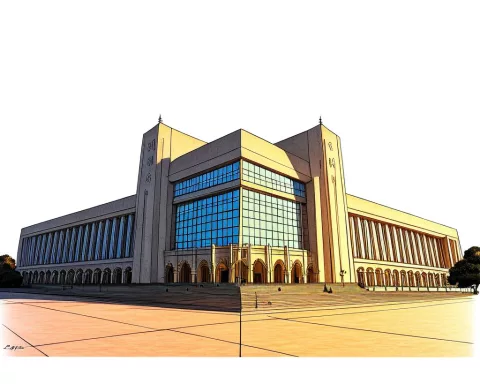Newly elected chairpersons in the National Assembly committees bring a fresh direction to parliament. They oversee the administration of their respective committees and transform decisions into reports. Public meetings held by these committees allow ordinary South Africans to express their views and influence parliamentary decisions. Recently, 30 portfolio committees have been established, and sixteen portfolio committees held elections for chairpersons, including representatives for health, finance, and communication and technologies. Members of the public can attend debates or arrange a tour to witness democracy in action.
Roles and Responsibilities of the Newly Elected Chairpersons in National Assembly Committees
New chairpersons have been elected in the National Assembly committees, bringing a fresh direction to the Assembly. These chairpersons play a crucial role in steering meetings, overseeing committee administration, and transforming decisions into reports for presentation. They ensure smooth and efficient operation, and public meetings allow ordinary South Africans to express their views and influence the course of parliamentary decisions.
The vibrant and dynamic National Assembly (NA) committees, quintessential to our parliamentary democracy, have recently undergone a significant change. New chairpersons, each bringing their unique perspective, have been elected, marking a fresh direction for the Assembly. These committees, akin to miniature versions of the Assembly itself, play a pivotal part in the scrutiny of executive actions.
Roles and Responsibilities of the New Chairpersons
Newly assigned chairpersons now lead the committees, shouldering the crucial task of steering meetings and overseeing the administration of their respective committees. Beyond this, the chairpersons have the critical role of transforming committee decisions into well-crafted reports for presentation in the respective houses. In the intricate mechanics of Parliament, these chairpersons could be likened to the oil that ensures smooth and efficient operation.
These committees are far from being mere symbolic elements of our democratic structure. They assume a crucial responsibility in monitoring the executive and advocate public participation in the legislative process. Public meetings held by these committees offer an opportunity for ordinary South Africans to express their views and influence the course of parliamentary decisions.
Establishment and Composition of Portfolio Committees
In accordance with NA rules, the Speaker, in consensus with the Rules Committee, recently set up a variety of portfolio committees. These committees, each distinctive in its name, mark a significant step in the evolution of the Assembly. A total of 30 portfolio committees have been established, each comprising of full members and several alternate members.
The responsibility of determining the size of a portfolio committee rests with the Speaker, who decides it in agreement with the Rules Committee. The decision of the number of members from each party in a committee is made at the highest level. Following this, political parties appoint members to represent them on a committee and communicate their decision to the Speaker within five working days of the committee’s establishment.
Newly Elected Chairpersons Across Various Portfolios
Recently, sixteen portfolio committees held elections for chairpersons, with the remaining 14 set to follow soon. The list of newly elected chairpersons, each representing a distinct portfolio, includes:
- Health: Dr Sibongiseni Dlhomo
- Finance: Dr Mkhacani Joseph Maswanganyi
- Minerals and Petroleum Resources: Mr Mikateko Mahlaule
- International Relations and Cooperation: Mr Supra Obakeng Mahumapelo
- Justice and Constitutional Development: Mr Xola Nqola
- Employment and Labour: Mr Boyce Maneli
- Public Administration: Mr Jan Naude De Villiers
- Water and Sanitation: Mr Leon Basson
- Communications and Technologies: Ms Khusela Sangoni
- Transport: Mr Selelo Selamolela
- Correctional Services: Ms Anthea Ramolobeng
- Forestry, Fisheries and Environment: Ms Nqabisa Gantsho
- Defence and Military Veterans: Mr Dakota Legoete
- Monitoring and Evaluation: Ms Teliswa Mgweba
- Basic Education: Ms Khomotjo Joy Maimela
- Home Affairs: Mr Mosa Chabane
Inviting the Public to witness Democracy in Action
A notable aspect of our parliamentary system is that only Ministers, Deputy Ministers, parliamentary committees, and individual MPs can introduce bills in Parliament. This stipulation ensures the legislative agenda is steered by those elected to represent the South African people.
Parliament encourages individuals interested in observing democracy in action to arrange a tour or attend a debate. Information regarding directions and contact details can be found on the Parliament’s website.
Featured Member: Mr Selelo Donald Selamolela
We place the spotlight on one of the Assembly members, Mr Selelo Donald Selamolela from the African National Congress. Representing Limpopo, he was elected as a member of the Portfolio Committee on Transport. His role exemplifies the essential part each member plays in the advancement of South African parliamentary democracy.
The stage of South African politics, Parliament is the meeting point for the resounding acts of our political drama. With the election of new chairpersons, the National Assembly committees are ready to play their part in this ongoing performance. Through these committees, Parliament upholds its role as the protector of our democracy, guaranteeing that all South African voices are heard, and the executive remains accountable.
What is the role of the newly elected chairpersons in the National Assembly committees?
Newly elected chairpersons in the National Assembly committees play a crucial role in steering meetings, overseeing committee administration, and transforming decisions into reports for presentation. They ensure smooth and efficient operation, and public meetings allow ordinary South Africans to express their views and influence the course of parliamentary decisions.
How many portfolio committees have been established by the National Assembly?
A total of 30 portfolio committees have been established by the National Assembly, each comprising of full members and several alternate members.
Who determines the size of a portfolio committee and the number of members from each party?
The Speaker, in consensus with the Rules Committee, determines the size of a portfolio committee. The decision of the number of members from each party in a committee is made at the highest level.
Which portfolios have newly elected chairpersons in the National Assembly committees?
Sixteen portfolio committees held elections for chairpersons, including representatives for health, finance, minerals and petroleum resources, international relations and cooperation, justice and constitutional development, employment and labour, public administration, water and sanitation, communications and technologies, transport, correctional services, forestry, fisheries and environment, defence and military veterans, monitoring and evaluation, basic education, and home affairs.
How can the public witness democracy in action in Parliament?
Individuals interested in observing democracy in action can arrange a tour or attend a debate. Information regarding directions and contact details can be found on the Parliament’s website.
Who is Mr Selelo Donald Selamolela and what is his role in the National Assembly committees?
Mr Selelo Donald Selamolela from the African National Congress represents Limpopo and was elected as a member of the Portfolio Committee on Transport. His role exemplifies the essential part each member plays in the advancement of South African parliamentary democracy.












